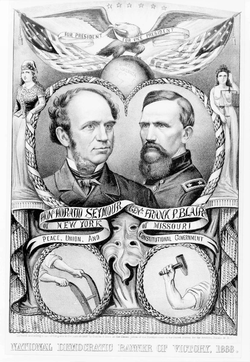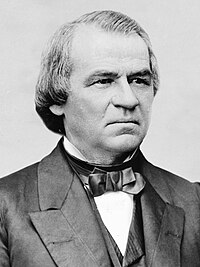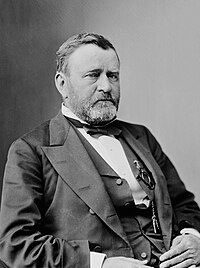Horatio Seymour 1868 presidential campaign
| Horatio Seymour for President | |
|---|---|
 | |
| Campaign | U.S. presidential election, 1868 |
| Candidate | |
| Affiliation | Democratic Party |
| Status | Lost general election |
In 1868, the
Background








The 1868 election occurred three years after the end of the
The run-up to the 1868 Democratic National Convention
After the 1866 elections, some prominent Democrats considered nominating
Another prominent candidate for the 1868 Democratic presidential nomination was
The 1868 Democratic National Convention
On July 4, 1868, the
On the first ballot, George Pendleton led with 105 votes to President Johnson's 65, Sanford Church's 34, and General Hancock's 33.5.[2] For the next several ballots, Pendleton increased his support among the delegates while Hancock moved into a distant second place and while Hendricks moved into third place.[2] Meanwhile, support for President Johnson dwindled until it disappeared on the 14th ballot.[2] On the seventh and eighth ballots, Pendleton peaked at 156.5 delegates – which caused New York's delegation to switch their support from favorite son Sanford Church to Thomas Hendricks.[2] As Pendleton's support collapsed, Hendricks took the lead for a while but was unable to sustain it after General Winfield Scott Hancock's home state of Pennsylvania added its delegates to his column – thus allowing Hancock to overtake Hendricks and to take the lead for the first time.[2] Ultimately, Hancock led through the 21st ballot.[1] Meanwhile, Salmon Chase’s name was put into nomination on the 17th ballot and George Pendleton’s name was withdrawn on the 18th ballot.[1]
On the 22nd ballot, General
Campaign
The 1868 Republican presidential nominee, General Ulysses S. Grant, did not openly campaign and instead left the job to surrogates.
As a result of the Democrats' feeling of hopelessness, Horatio Seymour—the 1868 Democratic presidential nominee – engaged in a speaking tour near the end of the 1868 campaign.
Results
In the U.S. presidential election on November 3, 1868, Ulysses S. Grant defeated Horatio Seymour in the popular vote by a 53% to 47% margin and in the electoral vote by a margin of 214 to 80.[1] 78% of the American electorate participated in this election – including 500,000 African-American men who voted for the first time in this election.[1] While Seymour lost the election, there were some bright spots for him.[1] Specifically, he won New Jersey, New York and Oregon and almost won California.[1] In addition, Seymour won Kentucky, Maryland, and Delaware.[1] In addition, it is worth noting that Grant only managed to win the popular vote in 1868 as a result of Black suffrage.[5] Historian Paul F. Boller Jr. wrote that "[i]t is apparent that if [Grant] had not won the 450,000 to 500,000 votes cast by the freedmen in the Southern states under military occupation, he would not have won his popular majority."[5]
In spite of the fact that Grant won the 1868 election, the Republicans largely lost interest in Reconstruction within the next several years – thus paving the way for the eventual emergence of the
References
- ^ a b c d e f g h i j k l m n o p q r s t u v w x y "HarpWeek | Elections | 1868 Overview (Page 2)". Elections.harpweek.com. Retrieved August 18, 2018.
- ^ a b c d e f g h i j k l m n o p q r s t u v w "HarpWeek | Elections | 1868 Overview (Page 1)". Elections.harpweek.com. Retrieved August 18, 2018.
- ^ "H-Net Reviews". H-net.org. April 2008. Retrieved September 22, 2018.
- ^ "HarpWeek | Abraham Lincoln Cartoons". Abrahamlincolncartoons.info. Retrieved September 22, 2018.
- ^ a b "Ulysses S. Grant Elected in 1868 Thanks to Black Suffrage in the South | World History". Worldhistory.us. July 4, 2017. Retrieved September 22, 2018.
- ^ Raoul Berger. "Government by Judiciary: The Transformation of the Fourteenth Amendment - Online Library of Liberty". Oll.libertyfund.org. Retrieved September 22, 2018.
